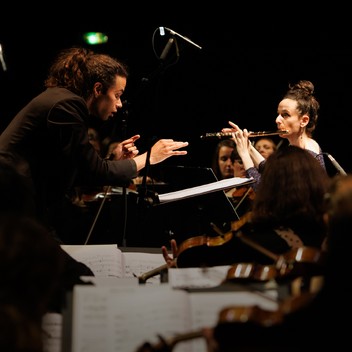Concert
Élan Award 2024

As patron of the Prix Élan 2024, composer Chaya Czernowin shares her hopes for young artists and the future of musical composition.
Chaya Czernowin : I am never trying to find myself in the students I am teaching. Quite the opposite. It might sound ridiculous, but my only criterium is to find people who are rather selfish, in the sense that they are not interested in anyone else’s music but their own. At the risk of seeming a bit militant, what I am looking for in somebody’s work, is a sort of roughness, something I have never seen before and that I find intriguing.
C.C. : My role, as I see it, is that I am here to help young composers to take flight, to stimulate their imagination. The rest is the responsibility of the musicians of the orchestra. What I am looking for is a vision, an inspiration. I want to see an imagination that is dancing, that is hungry for knowledge and whose eyes are wide open. You need to have a great creative intelligence in order to come up with the right original vision! If you already have that, the technique will find a way.
C.C. : It is very much a pity, that there is no room for more pioneering pieces. What I also find very sad is that orchestral pieces are only premiered once as part of a commission, and then are quickly thrown away. I cannot complain, because I am very lucky and my pieces have been performed many times. But young composers are not given the opportunity to see their pieces evolve from one performance to the other. Ideally, we should create opportunities where orchestras could take the time to develop new pieces, which would help giving visibility to still unknown young – or less young – composers.
C.C. : You know, everything has its time and every generation brings something new to the table. I think that we have to keep an eye on these changes, but also that it opens new fields of discovery. Despite everything, writers still write books and poets still write poems. Life is tough for poets these days. Poetry is probably the most neglected art. I have heard that the best way to learn about a country is through its poetical heritage, because it is a very pure form of art, which has a strong resonance for people.
C.C. : I am a very open-minded person and I always welcome change, because I believe that every initiative can have its benefits. Why should we always make choices? It is not a dialectic, and I think that the ones claiming it is simply are opportunists. What we need to fight against is the marketing system and the rise of mainstream culture, which is difficult to do, especially for those on the sidelines who suffer from a lack of visibility. But putting that aside, I welcome every initiative, even if it is different from what I believe in, because it can turn into an opportunity to learn something new.
C.C. : Rather than speaking of “market”, I would call it an arena of ideas. I can learn a lot from hip-hop dancing, or from the emergence of this new hybrid job of composer-performer… I can learn from a lot of things, but that does not mean that I necessarily have to seize every new opportunity. What I find most important is to always be able to challenge myself so that I can grow, and I don’t remain frozen in time.
Earlier, I explained that POETICA is made of layers. I believe that there are also “layers” in time, which leads us to a few existential reflections. What will remain of us in the future? What is the bigger process that is taking place?
I chose to fight for substance and longevity, but mainly for more depth. I think that depth is something that we are terribly lacking in our society.
C.C. : It is a fight, absolutely. And to go back to POETICA, that is exactly what this piece is about, as well as my other piece, Infinite Now. You have an individual, with all his layers of memory, surviving in the midst of a hostile environment. The breathing becomes here a desperate attempt to stay alive.
© Astrid Ackerman